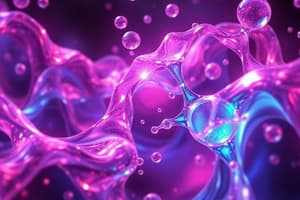Podcast
Questions and Answers
Which of the following is NOT an intermolecular force?
Which of the following is NOT an intermolecular force?
- London Dispersion Forces
- Covalent bonding (correct)
- Dipole-Dipole Forces
- Hydrogen Bonding
What type of intermolecular force is present in all substances, regardless of polarity?
What type of intermolecular force is present in all substances, regardless of polarity?
- London Dispersion Forces (correct)
- Hydrogen Bonding
- Ion-dipole Forces
- Dipole-Dipole forces
Which is the strongest intermolecular force below?
Which is the strongest intermolecular force below?
- London Dispersion Forces
- Hydrogen Bonding
- Dipole-Dipole Forces
- Ion-Ion Forces (correct)
What type of intermolecular force is present in KCl?
What type of intermolecular force is present in KCl?
What is the intermolecular force present in Cl₂?
What is the intermolecular force present in Cl₂?
Which of the following intermolecular forces is present in SO₂?
Which of the following intermolecular forces is present in SO₂?
Which of the following has the highest boiling point?
Which of the following has the highest boiling point?
Which of the following has the lowest boiling point?
Which of the following has the lowest boiling point?
The boiling point of CH₄ is much lower than that of HF. This is because __________.
The boiling point of CH₄ is much lower than that of HF. This is because __________.
What explains the very high melting and boiling point of water?
What explains the very high melting and boiling point of water?
Hydrogen bonding occurs when hydrogen is bonded to N, O, or F. Which of the following has hydrogen bonding.
Hydrogen bonding occurs when hydrogen is bonded to N, O, or F. Which of the following has hydrogen bonding.
Does H₂S have hydrogen bonding?
Does H₂S have hydrogen bonding?
All molecules have London forces between them, but dipole-dipole and hydrogen bonding are so much stronger than when they are present we can ignore London forces. Which of these has ONLY London forces?
All molecules have London forces between them, but dipole-dipole and hydrogen bonding are so much stronger than when they are present we can ignore London forces. Which of these has ONLY London forces?
What information do we look for on the periodic table if we want to examine intermolecular forces?
What information do we look for on the periodic table if we want to examine intermolecular forces?
If fluorine is stronger than carbon, what charge will the fluorine receive.
If fluorine is stronger than carbon, what charge will the fluorine receive.
A substance capable of hydrogen bonding has a _______ boiling point than a similar substance that doesn't hydrogen bond.
A substance capable of hydrogen bonding has a _______ boiling point than a similar substance that doesn't hydrogen bond.




